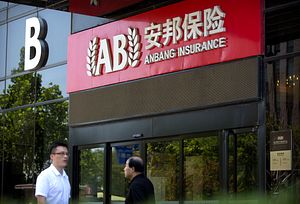On February 23, one day after China wrapped up the Lunar New Year holiday and resumed a regular work schedule, the Chinese government announced that it has taken over Anbang Insurance Group — the Chinese financial conglomerate that purchased the luxury Waldorf Astoria hotel in New York in 2014. The announcement also confirmed that founder Wu Xiaohui, who had been detained in China for unknown reasons since early June 2017, is officially being prosecuted for financial crimes.
According to the announcement published by the China Insurance Regulatory Commission (CIRC) on its website, the CIRC, together with other top financial regulators — including China’s central bank, the China Banking Regulatory Commission (CBRC), the China Securities Regulatory Commission (CSRC), and the State Administration of Foreign Exchange (SAFE) — has officially assumed control of Anbang. The takeover is expected to last for one year. But if Anbang “fails to achieve an equity reorganization or resume its normal operation” by then, the takeover could be extended for another year, though two years of government control would be the maximum, according to the announcement.
The announcement noted that China’s top regulators have formed a working group to fully take over Anbang’s daily management. The working group will “maintain the company as usual, ensure that the legitimate rights and interests of consumers will be fully protected, and safeguard all stakeholders’ interests in accordance with the law,” the announcement said. The takeover will not impact the external debt of the company.
A Chinese legal professional, who wishes to remain anonymous, told The Diplomat that the main object for the government is to maintain stability in the market and society at large.
According to Article 144 of China’s Insurance Law, the government may take over an insurance company under one of two circumstances: 1) the company faces serious insolvency; or 2) the company has violated the law, harmed the public interest, and may seriously endanger or has already seriously jeopardized its solvency.
Also on February 23, the First Branch of Shanghai People’s Procuratorate announced on its website that it has already initiated prosecution against Wu for fundraising fraud and embezzlement.
The legal professional told The Diplomat that in China the maximum penalty for the two crimes can be a life sentence.
As The Diplomat reported earlier, China’s anti-corruption campaign turned to the Chinese financial sector last year. On March 21, 2017 Chinese Premier Li Keqiang made a harsh speech about clamping down on “financial predators” :
[We will] crack down on illegal bank credit, insider trading, and interest transmission, insurance companies’ illegal acts. Regarding those regulators who collide with financial predators to conduct illegal acts, [they] must be severely punished as a warning to others.
Anbang’s Wu, the ex-husband of Deng Xiaoping’s granddaughter and a good friend of many China’s princelings, is widely believed to be one of these so-called “financial predators.” Over the past years, he had aggressively expanded his business into the global market.
Since 2015, Wu’s old princeling friends had started to cut ties with him, the first sign of potential trouble.
In 2015, Caixin published a report claiming that the marriage between Wu and Deng’s granddaughter had been “suspended.” Deng’s family confirmed that Anbang had “nothing to do with the Deng family anymore.” Meanwhile, several other princelings, whose names had always appeared together with Wu’s in news related to Anbang, publicly denied any relations with the company and complained that Wu had used their names without permission.

































